County, District, and State Youth Councils
The 4-H Program utilizes many tools or methods to provide education- al experiences for youth. The 4-H Council (or other relevant named group) at county, district, and state levels is one of these tools. A Council is an elected representative group of 4-H members who meet, discuss, plan, and assist in carrying out 4-H programs and activities in the interest of the total membership. The Council provides a link between local clubs or groups and County 4-H Programs, between County Programs and District 4-H Programs, and between District Programs and State 4-H Programs.
Why a 4-H Council?
Participation in a 4-H Council provides the means for the personal growth of 4-H members through citizenship and leadership activities. Many teens are looking for leadership roles and are interested in giving back to 4-H. Council participation gives 4-H'ers the opportunity to exercise their leadership knowledge and be of valuable assistance to 4-H Programs while youth further develop their leadership and citizenship skills.
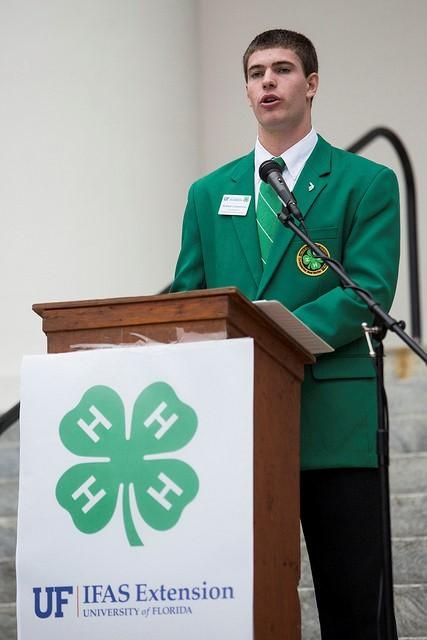
Credit: UF/IFAS
4-H Council Levels
In Florida 4-H, there are three levels of the council system: County, District, and State. The District level of 4-H councils use the thirteen 4-H Districts, rather than the five Extension Administrative Districts.
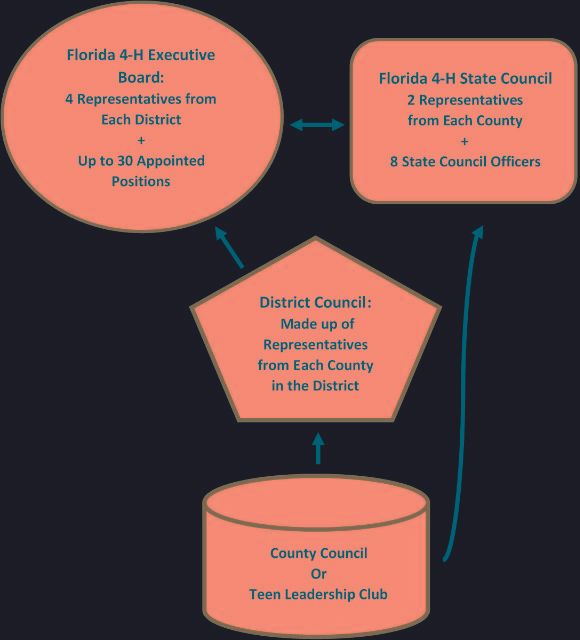
County Council
The County Council is the voice of the 4-H'ers in the county. It includes representatives from the 4-H Clubs and groups in the county.
County Teen Leadership Club
The Teen Leadership Club is an alternative to the traditional council model. Rather than create a council with representatives from every club, some counties opt to create a special club for teens focused on leadership development. The club members still assist with planning county programs and events, and the club fills the role of a county council. Members do not serve as representatives from every club. Instead, members may be enrolled in other clubs in the county, or the Teen Leadership Club may be the only 4-H Club they are affiliated with.
District Council
District 4-H Councils are composed of youth representatives from each of the county councils within their geographic 4-H District.
State Council
The Florida 4-H Council is composed of two voting delegates from each county that have joined by paying dues and the eight State Officers. The annual meeting of the 4-H Council is held at the Florida 4-H University event. At this time, the business of the Council is conducted and new officers are elected.
State Executive Board
The State 4-H Executive Board is made up of the eight state council officers, four elected representatives from each of the thirteen 4-H Districts, and up to thirty appointed positions. The Executive Board plans and implements many of the Florida 4-H State level programs and events.
County 4-H Council
Youth Leadership and Governance
Organization of the County Council should be useful, flexible, and efficient. Youth should be involved, as they are in clubs, with determining the rules for self-governance. These may take the form of County Council bylaws/Constitution. The County Council bylaws and Constitution patterned after the state bylaws and constitution serve as the organizational base in many counties (see "Florida 4-H Constitution and Bylaws" in this guide). If you have a County 4-H Council, become acquainted with the governing documents.
The following leadership roles are suggested:
- President
- Vice-President
- Secretary
- Treasurer
- Reporter
- Parliamentarian
- Sergeant-at-Arms
- Historian
- Recreation or Social Chair
Responsibilities of the officers are discussed in the Florida 4-H Officer's Handbook (4HGM10; https://edis.ifas.ufl.edu/4h049).
Annual Goals and Educational Programs at Council Meetings
The potential involvement of the County Council in the 4-H program is limitless. Suggestions are provided here to encourage ideas for additional involvement. One possibility is to assist in the planning and implementation of county 4-H programs. These programs might include:
- County events
- National 4-H Week Observance and other marketing efforts
- Community Service, State Council Project, or the 4-H Community Pride Program
- Summer camps, day camps, lock-ins, and retreats
- Achievement and recognition programs
- 4-H Day at the Fair
County Council members can be involved in spreading the 4-H word to:
- Civic groups and stakeholders
- Potential 4-H members/volunteer leaders
- Mass media, including newspaper, radio, and television
Conducting formal business should not take up the full meeting time. Time should also be allotted for recreation and an educational program. County Council meetings are an excellent opportunity to bring in a guest speaker, facilitate a leadership workshop, conduct a service project, etc.
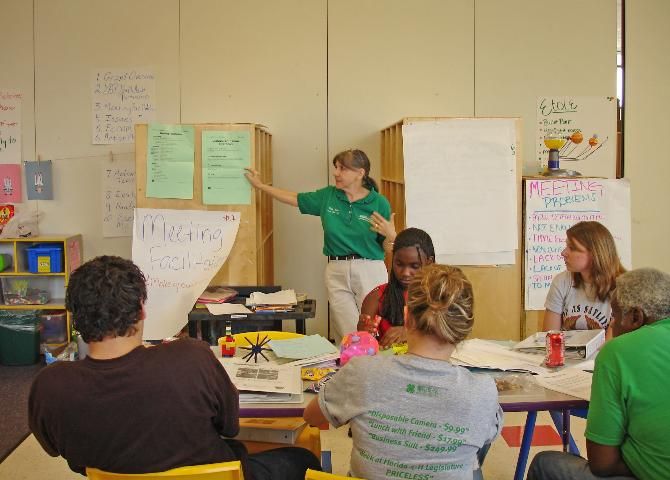
County Representatives to District and State Council
One of the roles of the council system is to provide representative youth voices in the district and state programming levels. Therefore, the county council has the opportunity to select youth to serve as representatives at the District Council and the State 4-H Council.
County Representatives to the District 4-H Council
Each District 4-H Council is made up of youth representatives from each of the counties within the geographic 4-H District. Refer to a copy of the appropriate District 4-H Council Constitution for the number of representatives each county should select for participation.
The delegates to the District have certain responsibilities, for example:
- Participating in the business discussions.
- Preparing an accurate reporting of the business and giving it to the Extension 4-H Agent and County Council members.
- Voting according to the desires of the county's 4-H members.
- Planning and implementing district level programs and activities.
County 4-H Voting Delegates to State 4-H Council
Each county selects two senior-level 4-H'ers to represent their county as voting delegates on the State 4-H Council. The State Council meets once each year in a business meeting at the Florida 4-H University. For county- elected delegates to be seated on the State 4-H Council, the county must pay its annual dues at the beginning of each 4-H program year to the Florida 4-H Council. An additional fee is assessed to counties paying dues after December 1.
District 4-H Council
Youth can gain valuable leadership skills as they represent their county and participate in the District 4-H Youth Council.
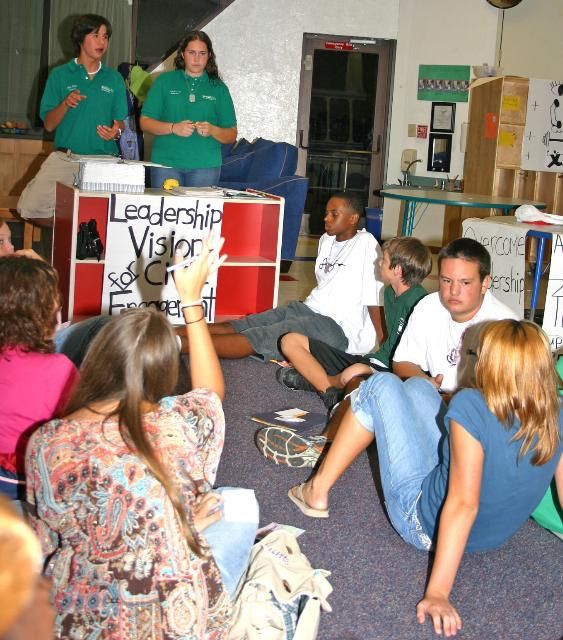
Purpose
The purposes of a District 4-H Council include the following:
- Assisting with organizing and conducting district activities and events.
- Facilitating the distribution of information from the district and state councils to the county councils.
Membership
A District 4-H Council is typically composed of two to four council delegates from each of the counties in the 4-H District. District councils may require that youth representatives be Intermediate- or Senior-level 4-H members. Refer to your district constitution for membership requirements.
Leadership and Governance
The organization of the District 4-H Council is stipulated in the constitution specific to each District. As with county councils, the organization should be useful, flexible, and efficient.

Annual Goals and Educational Programs at Council Meetings
A primary role of the District Council is to voice youth issues and concerns as well to assist in the planning and implementation of District 4-H programs. These programs might include
- District level events and activities,
- National 4-H Week Observance, and
- Membership, media, and marketing campaigns to benefit all counties.
As with County Councils, conducting formal business should not take up the full District Council meeting time. Time should be allotted for recreation and an educational program. District Meetings are an excellent opportunity to bring in guest speakers, facilitate leadership workshops, conduct a service project, etc.
Role of a County Representative to District Council
Youth elected to represent their county on the District 4-H Council have certain leadership responsibilities. Duties as County Representatives include the following:
- Attending meetings of the District 4-H Council.
- Communicating with the county regarding the activities and actions of the District 4-H Council.
- Soliciting the opinions of the 4-H members in the county for input into District wide program decisions.
- Assuming responsibilities as delegated.
- Working with 4-H Agents and Council Advisors to keep them informed of district council involvement.
- Learning about other County Councils within the 4-H District.
- Participating in District 4-H activities.
- Updating the district on programs taking place in your county.
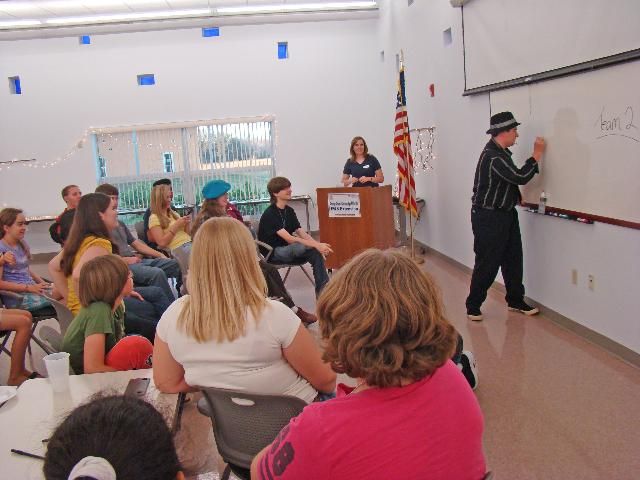
Elected District Representatives to State 4-H Executive Board
From within its membership, the District Council elects four (4) youth who serve as District Representatives to the Executive Board of the Florida 4-H Council (do not confuse this with the two (2) State 4-H Council delegates who represent the counties directly at the State 4-H Council annual business meeting).
How the State 4-H Council Works
The Florida 4-H Council is composed of two voting delegates from each dues-paying county and the eight State Council Officers.
The Annual Meeting of the 4-H Council is held at the Florida 4-H University, generally the only meeting during the 4-H year. At this time, the business of the Council is conducted and new officers are elected. The State 4-H Council Officers then represent the voice of youth on various statewide advisory boards, committees, and planning teams throughout the year.
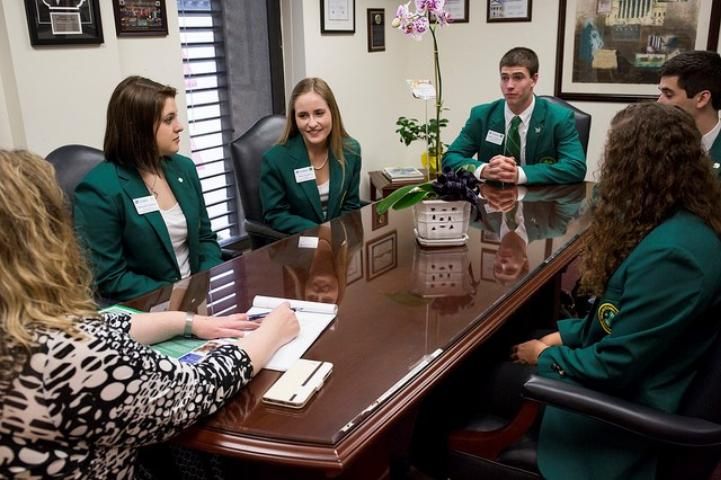
State 4-H Council Constitution
One of the key outcomes of the 4-H youth development program is empowering youth to learn self-governance. This begins with youth engaged in forming local clubs, planning educational programs, contributing to their community
through service, and establishing their own rules and bylaws. Likewise, the Constitution of the Florida 4-H Council and Bylaws serve as the base for the organization and work of the State 4-H Council. It is established and reviewed annually by the youth membership. The updated State Council Constitution and Bylaws can be found at http://florida4h.org/youth_/council/.
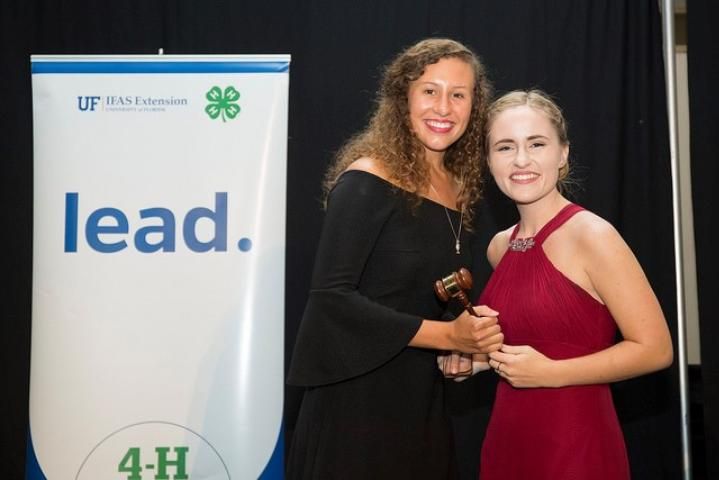
County Dues and Membership
The State 4-H Council consists of two (2) county youth representatives (commonly referred to as "voting delegates") from each county along with the eight State Council Officers. Each county to "seat" two voting delegates within the annual business meeting of the Council must pay annual dues. If the county does not pay the dues, they give up the right to vote on elected officers and any changes to the State Council Bylaws and Constitution. Dues are used to help support the State Council programs, which includes Executive Board. The counties are invoiced for their annual dues at the beginning of each 4-H program year.
State 4-H Officers
State Council Officers consist of the President, Vice President, Secretary, Treasurer, Reporter, Parliamentarian, Sergeant-at- Arms, and Historian. The first five are elected by the State Council at its annual meeting during the Florida 4-H University and the last three officers are appointed by the incoming president with advice from the other incoming officers.
The appointed officer candidates' applications are reviewed and interviews are conducted for each of these offices immediately following the election of the five new officers. The incoming president, advised by the other incoming officers, makes the final selection of the remaining three appointed officers during the Florida 4-H University and the newly elected/appointed officers are presented to the youth delegation before the close of the event. These new officers assume their responsibilities at the end of the Florida 4-H University.
Executive Board
The Executive Board of the Florida 4-H Council is the working group of youth leaders representing the district and county 4-H programs across the state. The Executive Board is composed of eight state officers, four representatives from each 4-H District, and up to thirty presidential appointees.
The Executive Board of the Florida 4-H Council meets three times per year at various Florida 4-H camps and has three functions:
- Representing 4-H with other agencies and organizations and at various 4-H events and activities
- Serving as a sounding board of 4-H membership
- Assisting with plans and implementation of 4-H Program events and activities, including:
-
- Florida 4-H University
- Florida 4-H Legislature
- Intermediate State
- Florida 4-H Day at the Capitol and Constitutional Revisions
The Executive Board of the Florida 4-H Council has standing committees that make recommendations for:
-
- Entertainment
- Ways & Means and State Fundraising Projects
- State Service Project
- Communication and Council Support
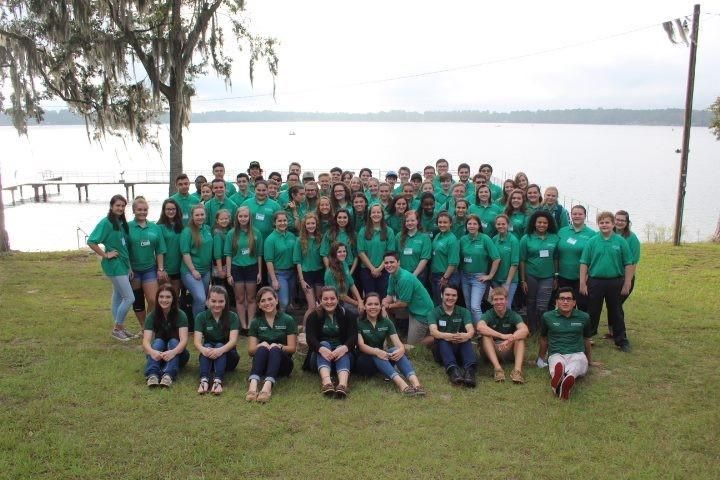
Role of a District Representative or Appointee to Executive Board
Four youth from each 4-H District are elected to represent their District on the Florida 4-H Executive Board. Additionally, up to thirty youth are selected to serve as Presidential Appointees to the Executive Board. This is a leadership position that carries certain responsibilities. Duties of a District Representative or Presidential Appointee are the following:
- Attending meetings of the Executive Board.
- Communicating with the counties in their 4-H District regarding the activities and actions of the State 4-H Council and Executive Board.
- Soliciting the opinions of the 4-H'ers in their 4-H District.
- Assuming responsibilities as delegated and agreed upon.
- Working with their 4-H Agents and Council Advisors to keep them informed of your Executive Board involvement.
- Clearing all appearances and travel as a representative of Florida 4-H through the State 4-H Office.
- Representing the entire 4-H District.
- Participating in District/State 4-H activities.
- Compiling District/State Reports to submit as requested by the State President/Reporter.
Council Delegates and Council Success
The success of 4-H Councils depends largely on how well council delegates fulfill their duties. To be chosen as a delegate is an honor and, like all honors, it carries certain responsibilities.
Will you be a good council delegate?
- Good delegates are honest, sincere, friendly, and loyal.
- They give everyone a chance to assist and share their opinions.
- Good delegates get things done right and on time. They are proud of their jobs and always try to do their best. They work with their 4-H Leaders to plan and carry out the council programs.
- Delegates to the 4-H Council are representatives, not only of the local club, but also of the entire 4-H organization.
- Council delegates represent 4-H to the people in the community, at school, and at events like service projects, public events, and fairs. This representation is one of the most important responsibilities, because to other people Council Delegates are a 4-H member all of the time—not just during a 4-H meeting.
- Serving as a 4-H Council delegate gives youth a real opportunity to develop leadership abilities that will be useful in any organization when they become an adult.
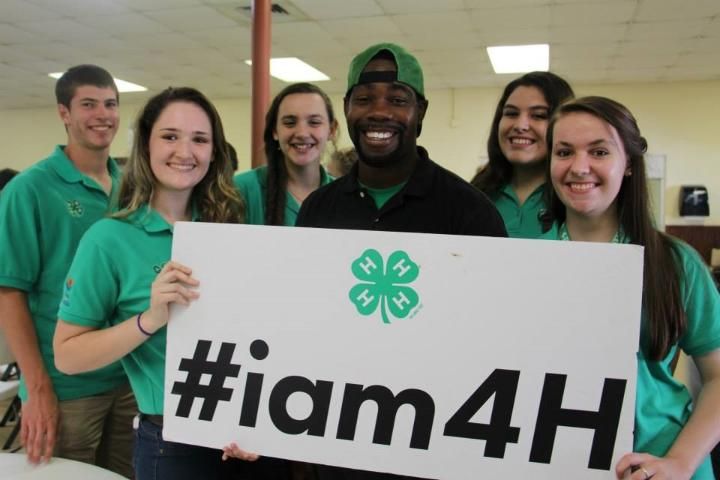
Responsibilities of Council Delegates
To be successful, 4-H Council Members work with 4-H Leaders and Advisors to perform many duties, including,
- Secure new members and organize local councils.
- Plan the program for the year.
- Arrange for a meeting place and for the proper care of it.
- Conduct and take part in the meetings.
- Follow through on assignments given during meetings.
- Keep the council records and give them to the leaders as required.
- Maintain a good spirit, good attitude, and a good working relationship with all individuals and groups.
- Help every 4-H'er find a place in the council and an opportunity to contribute.
- Maintain contact with the council advisor.
- Attend training sessions of the council when held.
Qualities of Good Council Delegates
4-H needs council delegates who will:
- Serve the council and stay involved all year.
- Work with all 4-H'ers and give everyone an opportunity to participate.
- Share leadership with many and thereby give others an opportunity to grow.
- Represent the best interests of the council to others.
- Be dependable.
- Help plan a program that the membership can support wholeheartedly.
- Work with the officers, committee members, and leaders.
Additional Resources to Support Organizing and Managing 4-H Councils
- Unlock Your Leadership Potential, UF/IFAS Extension
Unlock Your Leadership Potential is a 4-H Leadership curriculum designed to help 12- to 18-year-old youth learn and practice leadership skills. The Florida 4-H Leadership curriculum has eight major focus areas: (1) What Is Leadership? (2) Understanding Self; (3) Communication; (4) Getting Along with Others; (5) Learning to Learn; (6) Making Decisions; (7) Managing; and (8) Working with Groups. This curriculum can be found at https://edis.ifas.ufl.edu/pdffiles/4H/4H18100.pdf.
- Leadership Skills You Never Outgrow, Cooperative Extension Service, College of Agricultural, Consumer and Environmental Sciences, University of Illinois at Urbana-Champaign
This series of four project books is designed to help adolescents learn the basics of leadership. Starting with Individual Skills for Younger Members to Skills Leading Groups for Older Members, the books are filled with leader led activities for a group setting. The curriculum focuses on seven main topics: (1) Understanding Self; (2) Communicating; (3) Getting Along with Others; (4) Learning to Learn; (5) Making Decisions; (6) Managing; and (7) Working with Groups. For more details, refer to http://www.eric.ed.gov/ERICWebPortal/detail?accno=ED355051.
- Step Up to Leadership, National 4-H Cooperative Curriculum Systems, Inc.
Using this project series, you will share in the fun as you learn about the dynamic process of leadership! Mentor guides include background information, interactive exercises, and real-life experiences in relationship building, communication, group process, planning and organizing. All activities offer a cross-cultural perspective. This curriculum can be purchased by following the links at http://4hmall.com.
- Youth-Adult Partnerships: A Training Manual, created in partnership with The Innovation Center for Community and Youth Development, National 4-H Council, National Network for Youth, and Youth Leadership Institute
This manual provides activities and resources that guide experienced trainers and practitioners of all ages through the process of engaging youth and adults equally to create community change.
- Creating Youth-Adult Partnerships, created in partnership with The Innovation Center for Community and Youth Development and National 4-H Council
This curriculum leads youth and adults new to group facilitation and youth-adult partnerships to build their capacity to work together in true collaboration. This step-by-step curriculum includes detailed scripts, activities, and evaluation material.
Both above materials can be printed from online files from the Innovation Center at http://www.theinnovationcenter.org/catalog/toolkits/resources.
Advisors and Supervision
The State 4-H Council is responsible to the designated State 4-H Council Advisor. The State Council Advisor is a state staff member, designated by the Associate Dean of Extension and State 4-H Program Leader. Additionally, other faculty and/or volunteers may serve as State Executive Board Committee advisors. These adults work in partnership with State 4-H Council and Executive Board members to foster youth engagement and representative youth-adult partnerships throughout the Florida 4-H Youth Development Program.
The 4-H Pledge
Head, Heart, Hands, Health
I pledge...
my Head
to clearer thinking
my Heart
to greater loyalty
my Hands
to larger service
and my Health
to better living
for my club
my community
my country
and my world.
The HEAD represents:
- Thinking, planning and reasoning.
- Gaining new and valuable knowledge.
- Understanding the whys.
The HEART represents:
- Being concerned about the welfare of others.
- Accepting the responsibilities of citizenship.
- Determining the values and attitudes by which to live.
- Learning how to live and work with others.
- Developing positive attitudes.
The HANDS represent:
- Learning new skills.
- Improving skills already known.
- Being useful, helpful, and skillful.
- Developing respect for work and pride in accomplishment.
The HEALTH represents:
- Practicing healthful living.
- Enjoying life.
- Using leisure time wisely.
- Protecting the well-being of self and others